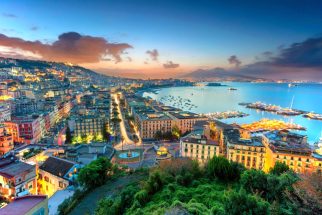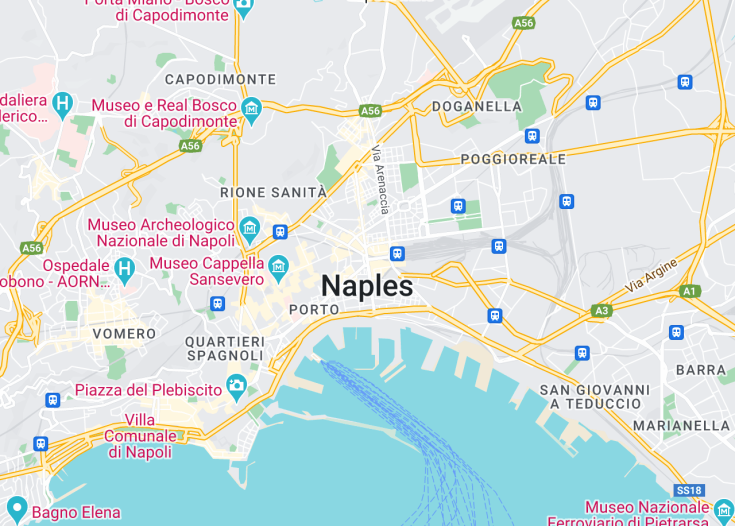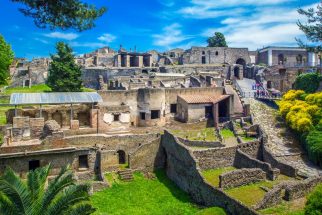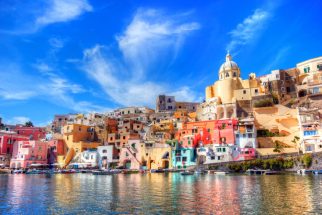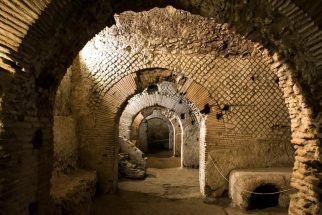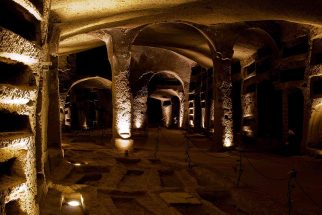Naples is a charming city, kissed by the waters of the Gulf of Naples and observed by the majestic volcano Vesuvius.
We suggest to stay for a minimum of four days in Naples, especially if you plan to discover the fascinating cities and villages in the near Costiera Amalfitana, like Procida and Capri.
By visiting Naples during the summer, you will enjoy the warm sea and the gorgeous beaches around the “partenopean” city.
Top things to do & see in Naples
Select the following sights and activities to discover best tickets and tours available in Naples.
The city of Naples
| Country | Italy |
| Region | Campania |
| Time in Naples |
UTC+1 (CET) Summer (DST) UTC+2 (CEST) |
| Language spoken | Italian |
| Currency | Euro (€, EUR) |
| Airport | Naples International Airport (4.3 mi, 7 km) |
Naples is the third-largest city of Italy, after Rome and Milan. It is one of the oldest urban areas in the world and has a lot to offer to tourists, both inside the city and in the surrounding, like Pompei, Ercolano, Procida.
Where is Naples, Italy?
Naples is located in the Campania region, in the south-center of Italy. It lies on the west coast of the Italian peninsula, 190 km southeast of Rome.
When was Naples founded?
Naples was founded in the first millennium BC, Naples is one of the oldest continuously inhabited urban areas in the world. In the ninth century BC, a colony known as Parthenope was established on the Island of Megaride. In the 6th century BC, it was refounded as Neápolis. The city was an important part of Magna Graecia, played a major role in the merging of Greek and Roman society, and was a significant cultural centre under the Romans.
Naples and the legend of Parthenope.
Naples is known as the “parthenopean city” and this name derives from the myth of Parthenope. The myth tells of the Greek Parthenope (from the Greek “virgin”) as the founder of the city. The myths are many and different from each other, but one thing that unites all the variants is that Naples was founded with love and for love. There are three most important variants of this myth linked to the city of Naples, choose the one you prefer.
First variant of the myth of Parthenope.
In the first variant Parthenope was a mermaid who lived among the rocks in the middle of the sea. With her singing she tried to seduce Ulysses but without result. She never accepted the refusal and she killed herself in the sea. Her body was carried by the waves to the little island of Megaride. Here, Parthenope’s body dissolved, taking shape in the ciity of Naples: Capodimonte is her head and Posillipo is her tail.
Second variant: the myth of Parthenope according to Matilde Serao.
The second variant of the story is according to Matilde Serao, a Neapolitan writer of 20th century. Parthenope was a Greek girl and fell in love with the Athenian Cimone. Parthenope’s father promised her in marriage to another man and for this reason the two lovers left Greece and arrived in the Gulf of Naples. Then they were reached by their families, beginning to inhabit the city. Parthenope gave birth to 12 children and according to Matilde Serao, Parthenope never died to stay with her people.
Third variant: the myth of Parthenope and Vesuvio.
Parthenope was a mermaid and met the centaur Vesuvio. With the complicity of Eros they fell in love but Zeus was in love with Parthenope at the same time and to divide them he transformed Vesuvius into a volcano at the edge of the gulf. The separation for Parthenope was unbearable and she killed herself. Her body was dragged by the waves to the coast of the island of Megaride and she assumed the shape of the city.
“See Naples and then die”: what does it mean?
It is an expression attributed to Johann Wolfang von Goethe. It refers to the breathtaking beauty of the city: according to him Naples is so beautiful that after having seen the city one does not need to see anything else.
History, art, architecture
The most noticeable forms of architecture visible in present-day Naples are the Medieval, Renaissance and Baroque styles. Naples has a total of 448 historical churches and for this reason the city is one of the favourite destinations for pilgrims.
In every corner of the city there are historical testimonies of the past, for example Naples is renowned for ots historical castles: Castel dell’Ovo (“Egg Castle”), Castel Nuovo (better known as Maschio Angioino), Castel Capuano and Castel Sant’Elmo.
Visit Naples
Cuisine.
Everything in the city is rich in art and history, starting with the food. Naples is the home of pizza but it can also boast many other delights in its culinary heritage. Here you can taste the delicious mozzarella and eat the traditional Neapolitan dishes such as peppered mussels, spaghetti with clams,, the famous babà, sfogliatelle and pastiera. Obviously you can not miss a cup of coffe and Naples is famous for its “suspended coffe“. This practice is the most striking example of solidarity understood as proximity to the neighbor in difficulty. A customer’s pays for an extra coffee or coffees in a coffee shop and if someone who can not afford to buy a hot drink comes and asks for a “suspended coffee” they get one of these pre-paid ones for free.
Naples and superstitions.
No city in the world has so many legends, stories and rituals about superstition as Naples. There you can buy the famous red “lucky horn“, a scaramantic and good luck object used in the past to defend oneself against the evil eye and negative influences.
When to visit Naples
The best seasons to visit the city are spring and autumn, far from the heat and the crowd of summer, but even in winter the city is charming to explore on foot.

